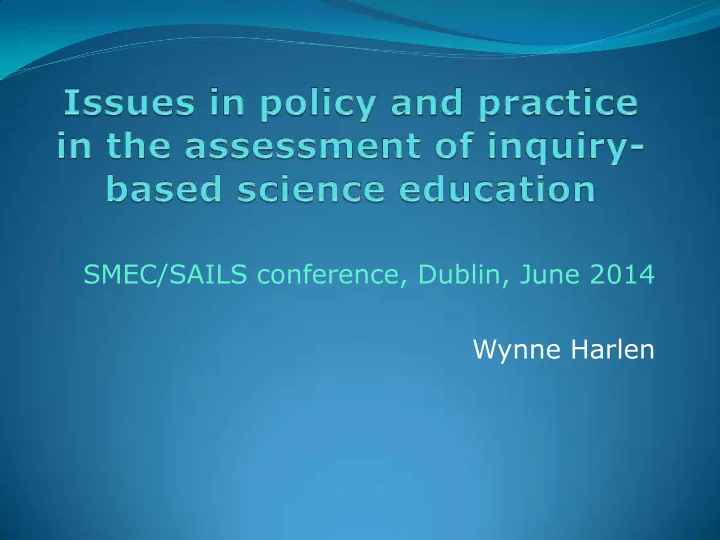

SMEC/SAILS conference, Dublin, June 2014 Wynne Harlen
Four issues: The disconnect between the aims, goals and values of 1. education and what is currently assessed. The disconnect between the aspirations of using 2. assessment formatively and the reality of the predominance of summative uses. The disconnect between the way in which we assess and 3. what we understand about how students learn. The disconnect between the narrow range of goals 4. currently assessed and the goals of education in a global context .
Issue 1 The disconnect between the aims, goals and values of education and what is currently assessed.
Impact on pedagogy and curriculum content Pedagogy Assessment Content Content
Positive and negative impacts Positive( formative and summative) formative feedback in the classroom reporting and recording progress formative evaluation of the school operational meaning of objectives Negative (summative) Narrow range of goals High stakes use ‘Teaching to the test’ etc
Issue 2 The disconnect between the aspirations of using assessment formatively and the reality of the predominance of summative uses.
Goals C Student’s activities (steps in learning) B A Decision about how to take Collection of evidence relating to goals next steps Next steps Students Evidence in learning Decision Interpretation of about next steps evidence Judgement of achievement
Formative assessment Students engaged in expressing and communicating their understandings and skills through classroom dialogue, initiated by open and person- centred questions. Students understanding the goals of their work, having a grasp of what is good quality work. Students being involved in self-assessment so that they take part in identifying what they need to do to improve or move forward. Feedback to students that provides advice on how to improve or move forward and avoids making comparisons with other students. Teachers using information about on-going learning to adjust teaching so that all students have opportunity to learn. Dialogue between teacher and students that encourages reflection on their learning
Evidence for effectiveness of formative assessment Black and Wiliam’s 1998 review of empirical studies of classroom assessment: “Improved formative assessment helps the (so - called) low attainers more than the rest, and so reduces the spread of attainment whilst raising it overall”.
Summative assessment The bad guy??!! Drives out formative assessment (Pollard et al 2000) Focuses learning on what is tested. ….but can’t be avoided!
Reconciling formative and summative Use formative assessment data for summative purposes: portfolio collection of range of evidence from activities resulting from formative assessment (eg Queensland) best evidence summarised using end of course performance descriptors Use summative data formatively: feedback from tests (mainly teachers’ tests)
Issue 3 The disconnect between the way in which we assess and what we understand about how students learn.
Views of learning Behaviourism (“Learning is being taught” ) Cognitive constructivism (“Learning is individual sense- making”) Socio- cultural constructivism (“Learning is building knowledge as part of doing things with others.”)
Implications for assessment Does this: give a valid assessment of learning like this:
Research in Denmark (Dolin and Krogh 2010) on PISA item “When compared directly and following the scoring criteria of PISA, pupils’ performance increased by 25% when they were allowed to exercise their knowledge in a socio-culturally oriented test format.”
Issue 4 The disconnect between the narrow range of goals currently assessed and the goals of education in a global context.
Beyond concern with content and pedagogy Can science education and its assessment make a contribution to goals relating to major global issues? Do we, can we, in the way we go about science education and its assessment, facilitate understanding of issues such as global poverty and climate change ?
A role for assessment? Science education has a key role in developing understanding of the impact of human activity on our global environment We should ensure that all assessment helps this learning: Using assessment formatively Monitoring progress towards the understanding of powerful ‘big’ ideas.
Four issues: The disconnect between the aims, goals and values of 1. education and what is currently assessed. The disconnect between the aspirations of using 2. assessment formatively and the reality of the predominance of summative uses. The disconnect between the way in which we assess and 3. what we understand about how students learn. The disconnect between the narrow range of goals 4. currently assessed and the goals of education in a global context .
Implications for IBSE IBSE variously defined in terms of: Practices of scientific investigation Answering questions Developing understanding through investigation Behaving as a scientist What it is not: another name for practical work all about developing ideas about science and not of science all about ‘discovery’ appropriate only at the primary school level (up to age 11 or 12).
A model of the development of understanding through inquiry New experience/question Alternative ideas Bigger Possible explanation Existing idea idea Prediction Plan and conduct investigation Interpret data Conclusion
Assessing the process and outcomes of inquiry Formative assessment is essential to inquiry-based learning, but… attention must be given to summative assessment if learning is to be improved through formative assessment and IBSE Both the skill and understanding dimensions of IBSE need to be assessed in combination 2-dimensional learning requires 2- dimensional assessment. …or is it 3 -dimensions as the NRC (2014) suggests in Developing Assessments for the NGSS ?
Final points Valid assessment of IBSE outcomes requires students to be working on tasks involving some aspects of inquiry Assessment by teachers can use a wide range of evidence, but requires some quality assurance measures Moderation should be part of the procedures (valuable CPD) The potential of screen-based assessment yet to be fully explored.
Thank you for your attention
Recommend
More recommend